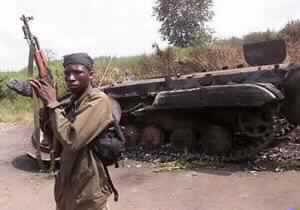French troops evacuated foreigners Saturday from a rebel-held city in western Ivory Coast as loyalist troops headed toward the area with orders to oust the insurgents. Eighty-three of 160 foreigners seeking to leave the city of Man were flown south to Abidjan, the commercial capital of this former French colony. The others were expected to follow on a second plane during the night, said Lt. Col. Ange-Antoine Leccia, spokesman for the French force.
It was not known if there were any Americans among the evacuees, half of whom are believed to be French citizens.
Earlier, the French soldiers got into gunbattles with the rebels in Man while trying to secure the airport for the evacuation. One French soldier was wounded and at least five rebels were killed, Leccia said.
It was not the first time French forces have flown to the rescue of foreigners trapped by fighting. In September, French and American soldiers rescued hundreds of French, American and other Westerners from northern towns seized by rebels.
The government of President Laurent Gbagbo says the two insurgencies, the one in the west and that in the north, are related. The northern rebels deny any connection.
The western rebels are a little known group who call themselves the Ivorian Popular Movement for the Greater West. They also hold Danane, a town 40 miles west of Man near the Liberian border.
Their motives aren't clear but in a statement Saturday, they blamed the clashes with the French on a "misunderstanding" and said there was no need for the evacuation.
Troops loyal to the government were headed toward the cocoa-rich western belt, with orders to oust the rebels from Danane and Man. But by Saturday afternoon, there had been no fighting.
Ivory Coast, the world's leading cocoa producer, was once considered an anchor of stability in West Africa. Now the government holds only the southern portion of the country, including the strategic port of Abidjan.
Some 1,000 French troops are in the country. They are monitoring a ceasefire between the army and the northern rebels - who call themselves the Patriotic Movement of Ivory Coast. The Oct. 17 agreement has crumbled in recent days.
The northern rebels say they are fighting against the discrimination of mainly Muslim northern tribes by Christian and animist southern groups that have traditionally dominated government.
Residents in Danane and Man described the new rebels as young men, dressed in a mix of military fatigues, black jeans, T-shirts and flip-flops. Some rode scooters, others had commandeered cars, but there seemed to be little discipline among them.
Some appeared to be Liberians, others were from the local Yacouba tribe, residents said.
"They are on drugs, they drink. These are people you can't trust," said one woman, speaking by phone from Danane.
"They have machine guns and are shooting in the air. I think more have come from Man," she said, before breaking off into a whisper. "I have to go. I think they are here."
Danane is about 20 miles from the border with Liberia - itself battered by a brutal seven-year war waged by many anarchic factions and a rebellion that still pitches government forces against insurgents based in the north.
The statement by the Popular Movement rebels was signed by Sgt. Felix Doh. It said the rebels wanted to avenge the death of former junta leader Gen. Robert Guei, who was killed at the start of the uprising in September.
Guei was the leader of a 1999 coup, the first ever in the Ivory Coast, and had strong support in the west.
The western rebels also claimed to have captured the town of Toulepleu, near the border with Liberia. Military officials, speaking on condition of anonymity, confirmed the attack but did not know the outcome.
Government officials also say there is a second group of western rebels, the previously unknown Movement for Justice and Peace, also believed to include supporters of Guei.
PHOTO CAPTION
An Ivory Coast rebel soldier from the Patriotic Movement for the Ivory Coast passes a burned-out government forced armored car during renewed fighting at Vavoua, some 500 kilometers (380 miles) northwest of the capital, Abidjan, November 30, 2002. Photo by Luc Gnago/Reuters
- Author:
& News Agencies - Section:
WORLD HEADLINES


 Home
Home Discover Islam
Discover Islam Quran Recitations
Quran Recitations Lectures
Lectures
 Fatwa
Fatwa Articles
Articles Fiqh
Fiqh E-Books
E-Books Boys & Girls
Boys & Girls  Hajj Rulings
Hajj Rulings Hajj Fatwas
Hajj Fatwas














